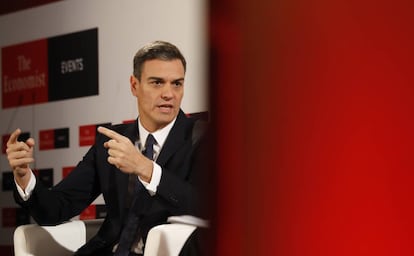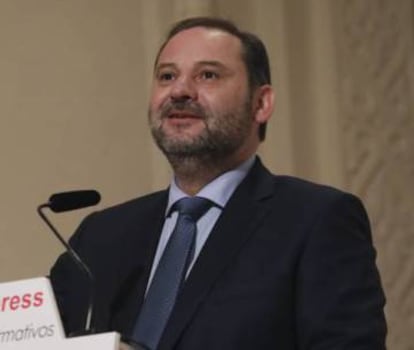Spanish PM opens door to 2019 general election if he can’t pass budget
Pedro Sánchez may abandon his plan to see out the legislature in a minority government, but not everyone in his Socialist Party is in favor of early polls

The Spanish government of Socialist Party (PSOE) Prime Minister Pedro Sánchez is considering holding general elections on May 26, 2019 – the same day that Spain will vote in local and regional polls and European Parliament elections.

On Monday, Public Works Minister José Luis Ábalos said the government had “not ruled out” calling elections in May as part of a “Super Sunday” election day. This is the first time a member of the PSOE central leadership has spoken openly about this possibility.
Sánchez confirmed that May 26 was one of the many options on the table but has said the decision has not been made yet. Speaking on Tuesday, the PSOE leader said he will make the final call, irrespective of what others think is best.
“I will call elections when I think they are beneficial to the general interest of the country. I am not going to do it for the sake of my party’s interest, and not, of course, because this or that other party tells me to,” said Sánchez in Madrid from The Spain Summit, a conference organized by the newspaper The Economist.
The government has three main options to call new elections: in March, on May 26 to coincide with local, regional and European Parliament elections, and in the fall.
Ábalos is seen within the PSOE and the government to be the strongest supporter of early elections. Those who second this view believe early elections will help the government take advantage of its rise in popularity, as seen in various polls, and prevent any backlash that could come from governing without a new budget.
The government has three main options to call new elections: in March, on May 26, and in autumn.
Sánchez, who came to power in early June through a no-confidence vote against Mariano Rajoy of the Popular Party (PP), heads a minority government with just 84 lawmakers in the 350-seat house. Without the support of other parties, the PSOE cannot approve a new budget and will have to govern with the former spending plan designed by the PP.
Sánchez said on Tuesday that if the budget is not approved, his “call to govern to the end of the term will be cut short.”
But not everyone on Sánchez’s team supports early elections. Some argue Sánchez needs more time to develop his progressive platform and there are doubts as to whether the PSOE will receive enough votes to form a government. Given the PSOE has not been able to win support for its budget, they believe it is unlikely the party can win enough votes for a Sánchez government. The PSOE could pact with the center-right Ciudadanos party but the two parties have distanced themselves recently and it is also not clear whether they have the numbers together.
Other PSOE members say it is not a good idea to hold general elections on the same day as regional polls. “No one would think of calling general elections together with Catalan regional elections. It would be better to have the regional and local elections in May and the general elections in the fall,” Emiliano García Page, regional premier of Castilla-La Mancha told Spanish television station La Sexta.
Some PSOE members believe early elections will help the government take advantage of its rise in popularity
Catalonia is a thorny issue for the PSOE. On the one hand, the threat of early elections could pressure Catalan regional parties, which, according to the government, are concerned Ciudadanos could win greater control and harden the government’s line on the Catalan independence movement.
But the May elections will also take place during the trial of Catalan independence leaders, who are accused of rebellion, misuse of public funds and sedition for their involvement in the unauthorized referendum of October 1, 2017 and the unilateral independence declaration that followed. Seeing as Catalan parties have refused to back the government’s budget because of its refusal to intervene in the charges, it is even less likely they will help swear in a Sánchez government.
All eyes are now on the upcoming regional elections in Andalusia. Results could provide some idea of where Spain’s four major parties – PSOE, the PP, Podemos and Ciudadanos – stand on a national level and whether early elections are likely.
English version by Melissa Kitson.
Tu suscripción se está usando en otro dispositivo
¿Quieres añadir otro usuario a tu suscripción?
Si continúas leyendo en este dispositivo, no se podrá leer en el otro.
FlechaTu suscripción se está usando en otro dispositivo y solo puedes acceder a EL PAÍS desde un dispositivo a la vez.
Si quieres compartir tu cuenta, cambia tu suscripción a la modalidad Premium, así podrás añadir otro usuario. Cada uno accederá con su propia cuenta de email, lo que os permitirá personalizar vuestra experiencia en EL PAÍS.
¿Tienes una suscripción de empresa? Accede aquí para contratar más cuentas.
En el caso de no saber quién está usando tu cuenta, te recomendamos cambiar tu contraseña aquí.
Si decides continuar compartiendo tu cuenta, este mensaje se mostrará en tu dispositivo y en el de la otra persona que está usando tu cuenta de forma indefinida, afectando a tu experiencia de lectura. Puedes consultar aquí los términos y condiciones de la suscripción digital.








































